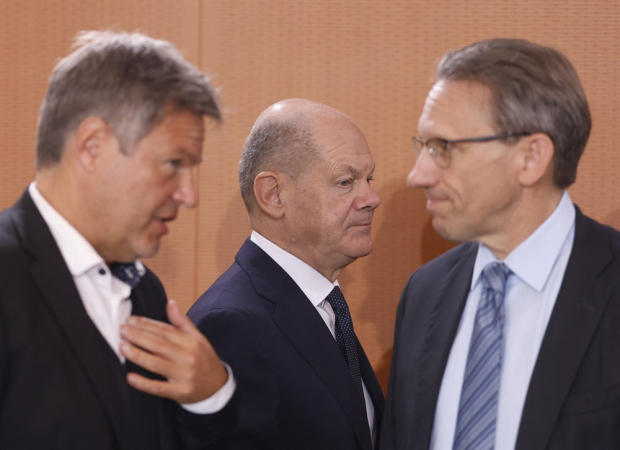
Published 11/07/2024 14:24 | Edited 11/07/2024 14:48
German Prime Minister, Social Democrat Olaf Scholz, is being pressured by the opposition to call new elections, after his coalition collapsed with the departure of Finance Minister Christian Lindner, from the liberal party, this Wednesday (6). Scholz appointed his advisor Jörg Kukies, 56, as the new head of the ministry at a time of greatest political instability in the country in recent years.
Lindner’s resignation triggered a series of resignation requests from liberal supporters of the German Executive, with the exception of Transport Minister, Volker Wissing.
Scholz’s coalition won the 2021 elections with 25.7% of the votes in the election for the Social Democratic Party of Germany (SPD, in its German acronym), joining forces with the Green Party (Die Grünen), which obtained 14. 8% of the votes, and the Liberal Democratic Party (FDP, in its German acronym), which received 11.5%.
Without the liberals, however, Scholz’s cabinet no longer has a majority in Parliament and is no longer capable of heading the government.
In a show of strength, Scholz harshly criticized Lindner this Thursday (7), the main political exponent of the FDP. While the Social Democrats and Greens advocate economic recovery through public investment, liberals want cuts and severe budgetary discipline.
Scholz said he would submit to a vote of confidence in Parliament in January, when the prime minister calls for the government to continue.
In an attempt to reach a political conclusion, the Social Democrat met with the opposition leader, Friedrich Merz, from the CDU. After the agenda, however, Merz stated that he was against the schedule presented by Scholz and said that the vote of confidence should be submitted to Parliament within a maximum of two weeks. “There is no reason for us to postpone this. The government is over,” declared the conservative.
Merz and the CDU appear ahead in voting intention polls, which gives their demand a certain electoral aspect. German legislation, however, leaves the rite in the hands of the chancellor, precisely to discourage opportunistic attempts to take power, a legacy from wartime. It would be necessary for the opposition to aggregate a majority in favor of a candidate for prime minister, something that seems unlikely in the current Parliament.
In turn, Scholz claims that the country first needs to debate and approve important projects, such as the 2025 Budget, measures to strengthen the economy, which has been struggling for two years and will now have Trump’s promised tariffs ahead of it, as well as the package support for Ukraine.
Now or in January, after the vote of confidence, it is up to the country’s president, Frank-Walter Steinmeier, to call new elections, a protocol measure, but which he takes based on his perception of the country’s governability. “The end of a coalition is not the end of the world”, said the president, in support of Scholz. “It is time for reason and responsibility.”
The parties that made up Scholz’s coalition have performed poorly in voter intention polls. Social Democrats, Liberals and Greens are behind the AfD, Germany’s rising far-right party.
Political crisis threatens Europe in Trump’s shadow
Political instability in Germany does not only represent a danger for the citizens of that country. For defenders of the European Union, the moment of crisis is a terrible coincidence with the geopolitical moment that the world is going through, shortly after the election of President Donald Trump, in the United States.
Europe’s largest economy and guarantor of the European bloc, Germany has been stagnant for two years with outdated infrastructure problems amid a tariff war already declared with China and a new front with the protectionist Trump administration, which is expected to overtax European products, mainly the automotive sector – Germany’s export product par excellence.
With the foreshadowing of a political and economic crisis in the bloc’s largest economy, anti-European Union groups, linked to nationalist and far-right political parties, could gain political ground in the next European elections.
Pro-European Union groups fear that political instability in Germany will have an impact on the bloc’s interests in a context of growing animosity with Russia and the discreditability of NATO, the North Atlantic Treaty Organization.
The Western alliance has been criticized by Trump on several occasions due to the low investment in Defense by European bloc countries. NATO requires member countries to invest at least 2% of GDP (Gross Domestic Product) in the sector. The American claims that Europeans should invest more, accusing the old world of using Americans as a kind of watchdog.
Source: vermelho.org.br

